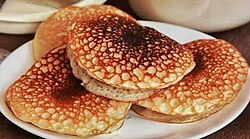Salukara is a type of pancake of the Waray people in Eastern Samar, Philippines. It is made with galapong (or glutinous rice flour), coconut milk, sugar, and water, the same ingredients to make the cake called bibingka. Traditionally tubâ (palm wine) is used as the leavening agent, giving the pancakes a slightly sour aftertaste, though standard baker's yeast can be substituted. They are cooked in a pan or clay pot traditionally greased with pork lard or lined with banana leaves. They are commonly eaten for breakfast and for merienda.[1][2]
 | |
| Alternative names | salokara, salucara, salocara |
|---|---|
| Course | Dessert, breakfast |
| Place of origin | Philippines |
| Region or state | Eastern Samar |
| Serving temperature | Hot or warm |
| Main ingredients | Rice flour, water or coconut milk, sugar, tubâ wine/yeast |
| Variations | see Bibingka |
Description
editSalukara is a Filipino pancake, made with galapong, or ground rice flour.[3] Simple yeast is used as a raising agent, while some use tuba, or palm wine. Rice is used to make it, with native rice being used.[4] It is cooked in pans with pork lard.[5] It is then contained in banana leaves.[4] It tastes like bibingka, with a hint of puto.[6] It has been compared to American pancakes.[7]
History
editSalukara was already a delicacy from the Spanish tenure, with ingredients unchanged.[4] Salukara was enjoyed by Ben Evardone, Eastern Samar's governor, House Representative Maria Fe and Actor Boy Abunda also enjoyed this dish. It appeared in television shows and festivals.[8] Salukara is regularly sold near populated places.[9][10] In July 2019, Salukara was one of the entries in the Can-avid town festival.[11] In December 2022, it was one of the entries in the Arteche town festival.[12]
See also
editReferences
edit- ^ Uy, Amy A. (September 1, 2013). "Rice cakes, roscas, and more eats at the Samar Food Fest". GMA News Online. Retrieved October 17, 2018.
- ^ "Linamnam at Latik: Ang pagkain ng Samar". GMA News Online. November 16, 2012. Retrieved October 17, 2018.
- ^ Alegre 1994, p. 24.
- ^ a b c Cabueñas, Cyrain (May 24, 2020). "Chasing dreams, hundreds of 'salukara' at a time". Inquirer. Retrieved December 18, 2024.
- ^ "The Many Faces of Bibingka - IFEXConnect". IFEX Connect. Retrieved December 19, 2024.
- ^ Mariano, Nicky (September 4, 2022). "Unique Dishes From Eastern Visayas". Lola's Recipes. Retrieved December 19, 2024.
- ^ Dumlao, Tina (July 20, 2003). Sulat don amour. Philippine Daily Inquirer.
- ^ "'Salukara' The stuff of their dreams". Retrieved December 18, 2024 – via PressReader.
- ^ The Center 2003, p. 12.
- ^ Santos, Mari-An (October 21, 2023). "Spot Stays: This Pet-Friendly Airbnb Is Your Home in Eastern Samar's Surf City". Spot.ph. Retrieved December 19, 2024.
- ^ "E. Samar town festival takes pride in native delicacies". Philippine News Agency. Retrieved December 19, 2024.
- ^ "Karan-on Bazaar in Arteche, Eastern Samar this Christmas revives vanishing tradition". Manila Bulletin. Retrieved December 19, 2024.
Bibliography
edit- Alegre, Edilberto N. (1994). Pinoy Na Pinoy!: Essays on National Culture. Anvil. ISBN 978-971-27-0399-7.
- Tomás: The Literary Journal of the UST Center for Creative Writing and Studies. The Center. 2003.